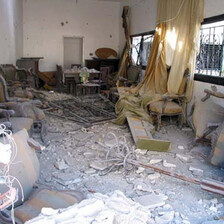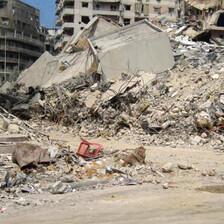Bint Jbeil 17 September 2006

A perfume shop in the Bint Jbeil market was destroyed during the conflict. (Misbah Hammoud/IRIN)
In the south of Lebanon, a popular revolution is taking place, and its chosen leadership is Hizballah. In speaking with people, their animation, their sense of community, their commitment to the collective of the community, their disregard of individualism, their complete moral and emotional assurance of what is good and right, their total disrespect of inequality animates them and all they do.
In Bint Jbeil we saw almost total destruction and this destruction encompassed all parts of life. Yet in the middle of this damage there were a few amazing jewels of life bubbling open. In the south of Lebanon the landscape is covered with the dust of missiles and destruction. The trees, the weeds, and the cultivated plants are coated with a sickening yellow dust that immediately impresses a sensation of poison and death. Inside the villages, the dust and garbage spread through all parts of the town regardless of the damaged areas. Areas of massive destruction looked like strange cliffs and fields of broken cement chunks interspersed with bits of brightly colored cloth or plastic. Children’s shoes, schoolbooks, clothing, shards of wooden furniture, and shiny bits of metal were all smashed flat and embedded in the rubble.
Of all the villages that we saw, Bint Jbeil was most completely ground up by Israeli missiles sent with messages of racist hate. The town seemed abandoned with some amazing exceptions. Shop after small shop had its doors damaged, pockmarked, bent out of their frames, made inaccessible by mounds of broken cement. Slabs of cement hung precariously askew from bent lines of steel reinforcements. Yet in the middle of this general yellow-gray there were some precious flowers of life blooming from somewhere deep in the hearts of the people.
A brave woman wearing the traditional Muslim scarf ran over to us as we were interviewing a father, grandfather, and a grandchild who were opening their shop to a street of destruction empty of people. The father told us that this is his shop and this is his land and this is his village and nothing is going to remove him from it. At the side of his shop door was a huge gash where cement and cinderblocks were absent, yet sandals, slippers, shoes, and shoe boxes were being arranged enticingly, colorfully like blooms of organized labor and beauty in the midst of the Israeli-created destruction. Across the street was the woman’s shop where beautiful scarves, folded and stacked, or hanging from their corners in bunches, waving in the air. On either side of the shop were mounds of destruction, garbage, and closed shops all damaged and bent. The shop looked like a pungent rare flower springing to life amidst the hostile rubble. This is resistance, courage, determination — this is sumoud (persistence).
Down the street there was music and a few more open shops. The magnetic enthusiasm of the songs irresistibly drew us in. We found a cart with tapes, CDs, and other Hisbullah paraphernalia all joyfully presented. After spinning around to see as much as possible we began our drive to Aintura where our friend from the scarf store met us excitedly to tell us more about what they saw and heard during the attempted Israeli tank invasion of the south. She said that she was there all the time and that on top the hill just outside Bint Jbeil, she and others watched as the Israelis bombarded Bint Jbeil and Aintura. They cried after seeing the destruction but were determined to stay. She proudly pointed to several rows of olive tress curved along a mountain, and told us that the Israelis never got beyond that line and that the brave defenders were able to stop them and their tanks.
I think of how I did not buy a pair of slippers or some scarves. They would have been both useful and beloved. But the experience of revolutionary sumoud remains, and its international nature is clear. Our friend of the scarf was just like a worker in Yugoslavia, some years before the fall of working-class rule, who waited for me and a friend on the road, knowing that we would be hours in a restaurant that she had directed us to. On our way out we found each other and she took us home with her and gave us incredible in-depth details of the life of a worker in a working-class state. She was enlivened by the same energy as our new friend in the south of Lebanon.
However, the revolutionary spirit skips a few unfortunate ones. As soon as we were away from the shoe and scarf shops a little jeep came by and I asked if they would let us interview them. The old man near the door and his son behind the driver’s wheel immediately began to apologize, saying that they were not Arabs, that they were Phoenicians. I was taken aback and began to wonder what on earth they saw in me to say such things. This is especially disturbing since the Israeli border is still so close and since the Israelis are known to make hostile excursions into the area. Did the man and his son in the Jeep think me an Israeli? Did they think me an American reporter? After a bit of discussion, they seemed to flip politically and the son gave an interview that contained no indication of his Phoenician I-am-not-an-Arab apology.
Another older woman came running trying to tell us her personal problems. There was much of interest in what she said. Her family lands had been partially occupied by the Israelis since 1948 and more was taken during this war of July 2006. She was angry and told of her many responsibilities with which she could not cope. She had to care for four grandchildren whose mother was American and who refused to take them over to America so that they would be safe. But I noticed that each and every one of the people we talked to were wearing clothes that indicated they had a clean organized domicile, and that they must have had water in which to wash. No one looked like they lived in the dust and destruction, while we, arriving in a van, walking around briefly, were dusty and disheveled.
Samia Halaby is a Palestinian artist based in the US.
Related Links





